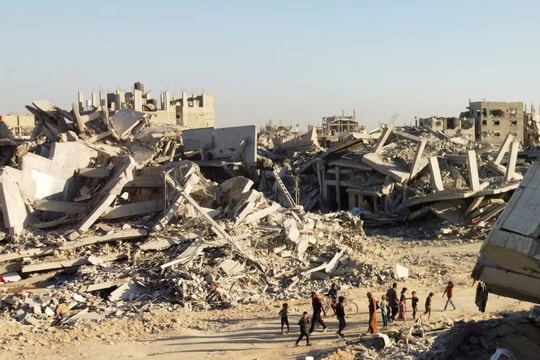Failure opens 'lifeline' for Prime Minister Netanyahu and Israel's 21 fateful days
(Baonghean) - Israeli Prime Minister Benjamin Netanyahu's main rival in the middle of this week officially admitted defeat in his effort to form a new government, meaning that he has crushed hopes of "overthrowing" the incumbent leader who has been in power for many years.
This development also pushes the Middle Eastern country closer to a third election in less than a year - something unprecedented in the past.
Political turmoil in 21 fateful days
The announcement, made by the leader of the centrist Blue and White party, Benny Gantz, has prolonged the political paralysis that has gripped Israel this year.
But for current Prime Minister Netanyahu, Western media, including the US AP news agency, commented that this information opens a new "lifeline" for the leader who is in a deadlock, struggling to stay in office in the face of the possibility of facing a sentence for corruption charges.
 |
| Mr. Benny Gantz is a former general in the Israeli army. Photo: Reuters |
Mr Gantz, a former Israeli army general, was asked to form a government a month ago after Mr Netanyahu failed to cobble together a coalition following inconclusive elections in September.
But in turn, during the past four weeks of intense negotiations, Mr. Gantz was also unable to muster the support of 61 members - the necessary majority in the 120 seats in the Israeli Parliament - before the deadline of the night of November 20.
Speaking to reporters, Mr. Gantz accused Prime Minister Netanyahu of sabotaging efforts to form a unity government between their parties.
“He should have gradually accepted the fact that the results of the elections required him to negotiate directly, without any obstacles or barriers. “The majority of the people chose a liberal unity government led by the Blue and White party. Most of the people voted to weaken the power of extremists, and most of the people voted to take a different path than Netanyahu has taken in recent years.”
Under Israeli law, the Knesset will now enter a 21-day period in which any lawmaker can seek to win 61 seats and become prime minister. That means both Mr Gantz and Mr Netanyahu will continue to try to find coalition partners and explore the possibility of a coalition government.
Other names could also emerge unexpectedly. If they fail, Israel will be forced to hold another election next March.
For his part, Mr. Gantz said that these were “21 fateful days in which Israel’s democracy will undergo its most important test,” and pledged to work to find a way to lead his country “out of the total paralysis it is suffering.”
 |
| Netanyahu supporters hold up posters in support of him. Photo: AFP |
According to AP, Mr. Gantz's Blue and White party is the largest party in the Knesset, with 34 seats, one more than Mr. Netanyahu's Likud party, meaning that if these two figures join forces, they can control the majority.
But in reality, after weeks of negotiations, they have been unable to agree on the terms of a power-sharing deal, including who will take over as prime minister first and what will happen if Mr Netanyahu is convicted.
Opinion polls suggest that a new election would produce similar results to September's inconclusive vote, signaling months of debate and debate ahead that are unlikely to yield any certainty.
Depressing outlook?
However, the race could be affected somewhat by the indictment of Mr Netanyahu in multiple corruption cases. According to AFP, after months of suspension, on November 21, Israel's longest-serving Prime Minister was accused of bribery, fraud and breach of trust by Attorney General Avichai Mandelblit.
Legally, Netanyahu is not required to resign as prime minister unless he is convicted, but it is clear that the leader is facing intense pressure politically.
More than ever, he wants to stay in office, hold on to his seat, to be able to fight the charges, and to have the prime minister's immunity from prosecution from the National Assembly.
 |
| Mr. Avichai Mandelblit has indicted Mr. Netanyahu on corruption charges, a move that could end the political career of the prime minister who has been in office for decades. Photo: AFP |
Netanyahu’s legal woes may be mounting, but the Likud party is still standing behind him. However, this could change if he is formally convicted, and he could then begin to face calls to step aside.
It is unclear how voters outside his political base will react to the possibility of their leader being impeached. Gantz has ruled out a partnership with Netanyahu, just as he faces trial, and has said he would not be opposed to working with Likud if it were led by someone else.
Avigdor Lieberman - a figure considered a "power broker" in Israeli politics, someone that both Gantz and Netanyahu cannot do without if they want to form a majority government, has announced that he does not support either of the two candidates.
Lieberman was the one who rejected Netanyahu's coalition after the April elections, forcing a second election in September. He also urged Gantz and Netanyahu to form a coalition government to break the deadlock, but when this failed, Lieberman made it clear that it was the responsibility of both men.
“There's no significant gap, it's mostly personal differences and at the end of the day, it looks like we're heading for another election,” Lieberman said.
 |
| Israeli Prime Minister Benjamin Netanyahu and his rival Benny Gantz have so far failed to form a governing coalition. Photo: AFP |
Yet, along with the risk of Netanyahu being convicted, rising regional tensions also carry the potential to force all sides to compromise, whether they like it or not.
Israel launched a large-scale attack on Iranian targets in Syria early on November 20, in response to enemy rocket attacks.
Israeli security officials now fear that Iran could retaliate, sparking an outbreak of violence just a week after Israel’s fierce war with Iran-backed militants in Gaza. Against such a backdrop, the prospect of another gruesome election weighs heavily on the already weary shoulders of Israeli voters.









